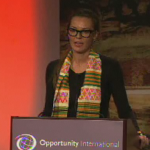Conference LiveBlog: Actress and Philanthropist Connie Nielsen
Actress Connie Nielsen spoke from the stage today at this morning’s plenary session at the Opportunity International Conference. Connie founded the Human Needs Project (HNP) and Road to Freedom Scholarships in the Kibera slums of Nairobi, Kenya. She spoke today about her work with HNP and the power of working with a community to implement sustainable solutions to poverty, creating development not aid.

 Highlights from Connie Nielsen’s Presentation
Highlights from Connie Nielsen’s Presentation
I was in a film called Lost in Africa. The premise of the film was that my adopted Kenyan son was lost without his cell phone and without his family, and so his isolation put him in danger. There are lot of children like this in Kibera, Kenya. This community of people founded our Human Needs Project. I was introduced to the way of life in these slums, a group of people who had no access to infrastructure. But this does not even begin to cover it. There is no running water, there is nothing. There are high mortality rates and low productivity rates. It becomes a prison. Human Needs Project operates from understanding that poverty is a prison but it is a prison that we can break out of.
William, my guide in Kibera, said that I could build a well. But the truth is, I realized that we could invest in putting in a well but within a few years, it would not be working anymore, and it’s the same with many businesses in the informal sector. Why is that? It’s because they are simply not set up to be sustainable. So we had to change our tack.
I imagine that acting involves empathy. That is what I do when I create a character. I have empathy for them, I try to understand their lives. And that same approach can be taken to community development. I met the people in Kibera, and I realized that we all have a lot in common.
When we’re talking about finding solutions to the problems the people face, we’re talking about infrastructure. We at HNP have seen a lot of organizations that come in to donate money. But what the Kiberans need is to own these projects. They are consumers and they want to pay for the services they use, if the services are good enough.
We have summoned innovative technologies and clean technologies to create clean water and a waste treatment system, because Kiberan systems are not hooked up to Nairobi’s services, which are themselves spotty and unreliable at times.
HNP has also implemented educational and training services. We believe that all these services will be the tipping point to enable a woman to change her life. We believe that this will be the method by which women will not only survive but be hopeful about their futures. This is why we call our work development not aid.
We asked the women what they would like to do with their lives. We got a lot of answers and we’ve incorporated them into our work. We’ve created a group of clean technology marketplace entrepreneurs and clean technology upgrades for homes at bottom-of-the-pyramid prices. We are implementing these changes with the community, and in the end, they know that it’s for the community.
A bit about Connie Nielsen
Connie Nielsen was born and raised in Denmark, and is best known for her portrayal of Princess Lucilla opposite Russell Crowe’s Maximus in the Academy Award-winning “Gladiator” (2000). Connie serves as a founding member of the Human Needs Project and Road to Freedom Scholarships in the Kibera slums of Nairobi, Kenya. As a board member of the Corporate Social Responsibility Fund in Denmark, she was a presenter at the “CSR Awards Show 2011” in September, interviewing Al Gore. In addition to being an accomplished actress, Nielsen is a trained singer, dancer and is fluent in English, German, Danish, Swedish, French and Italian.